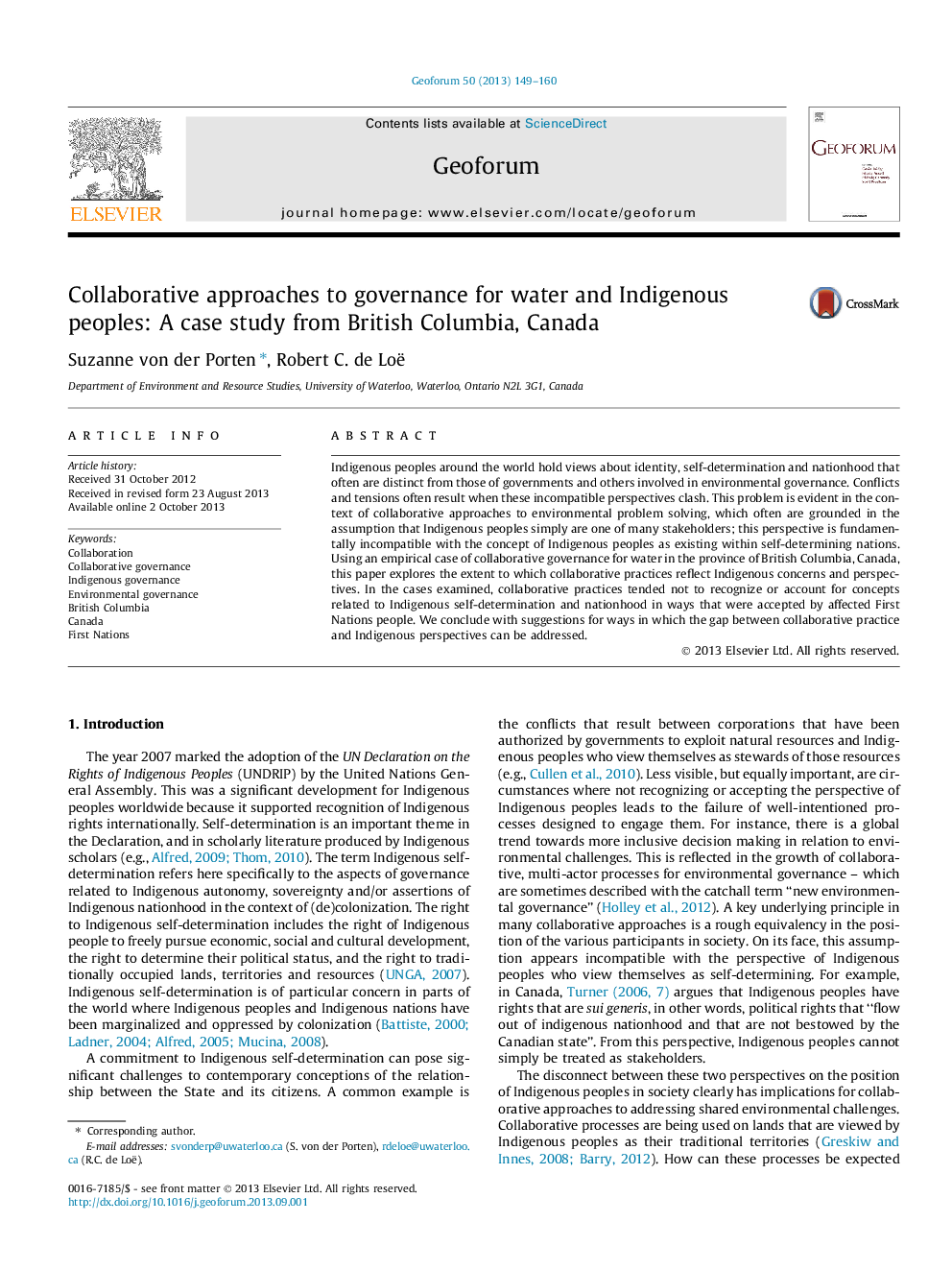| کد مقاله | کد نشریه | سال انتشار | مقاله انگلیسی | نسخه تمام متن |
|---|---|---|---|---|
| 5074128 | 1477139 | 2013 | 12 صفحه PDF | دانلود رایگان |
عنوان انگلیسی مقاله ISI
Collaborative approaches to governance for water and Indigenous peoples: A case study from British Columbia, Canada
ترجمه فارسی عنوان
رویکرد همکاری برای حکومت برای آب و مردم بومی: مطالعه موردی از بریتیش کلمبیا، کانادا
دانلود مقاله + سفارش ترجمه
دانلود مقاله ISI انگلیسی
رایگان برای ایرانیان
کلمات کلیدی
همکاری، حکمرانی همکاری، حکومت بومی، حکومتداری محیط زیست، بریتیش کلمبیا، کانادا، ملل اولیه،
ترجمه چکیده
مردم بومی در سرتاسر جهان، دیدگاه های مربوط به هویت، خودکامگی و ملیت دارند که اغلب با دولت ها و دیگران مرتبط با حکومتداری محیط زیست متمایز است. مناقشات و تنش ها اغلب زمانی اتفاق می افتد که این دیدگاه های ناسازگار با هم درمی آیند. این مشکل در زمینه رویکردهای مشارکتی برای حل مسائل زیست محیطی مشهود است که اغلب بر اساس این فرض است که مردم بومی به سادگی یکی از ذینفعان بسیاری هستند؛ این دیدگاه اساسا ناسازگار با مفهوم مردم بومی به عنوان موجود در کشورهای خود تعیین کننده است. با استفاده از یک پرونده تجربی از حکومت همکاری برای آب در استان بریتیش کلمبیا کانادا، این مقاله به بررسی اینکه چه شیوه های همکاری، منافع و دیدگاه های بومی را بررسی می کند. در موارد مورد بررسی، شیوه های همکاری تمایل به شناسایی یا تعریف مفاهیم مربوط به خودمختاری بومی و ملیت را به شیوه ای که توسط افراد ملل متحد مورد تأیید پذیرفته شده است، نمی پذیرند. ما با پیشنهادات برای راه هایی که شکاف بین عمل مشترک و دیدگاه های بومی را می توان در نظر گرفت، نتیجه می گیریم.
موضوعات مرتبط
علوم انسانی و اجتماعی
اقتصاد، اقتصادسنجی و امور مالی
اقتصاد و اقتصادسنجی
چکیده انگلیسی
Indigenous peoples around the world hold views about identity, self-determination and nationhood that often are distinct from those of governments and others involved in environmental governance. Conflicts and tensions often result when these incompatible perspectives clash. This problem is evident in the context of collaborative approaches to environmental problem solving, which often are grounded in the assumption that Indigenous peoples simply are one of many stakeholders; this perspective is fundamentally incompatible with the concept of Indigenous peoples as existing within self-determining nations. Using an empirical case of collaborative governance for water in the province of British Columbia, Canada, this paper explores the extent to which collaborative practices reflect Indigenous concerns and perspectives. In the cases examined, collaborative practices tended not to recognize or account for concepts related to Indigenous self-determination and nationhood in ways that were accepted by affected First Nations people. We conclude with suggestions for ways in which the gap between collaborative practice and Indigenous perspectives can be addressed.
ناشر
Database: Elsevier - ScienceDirect (ساینس دایرکت)
Journal: Geoforum - Volume 50, December 2013, Pages 149-160
Journal: Geoforum - Volume 50, December 2013, Pages 149-160
نویسندگان
Suzanne von der Porten, Robert C. de Loë,
